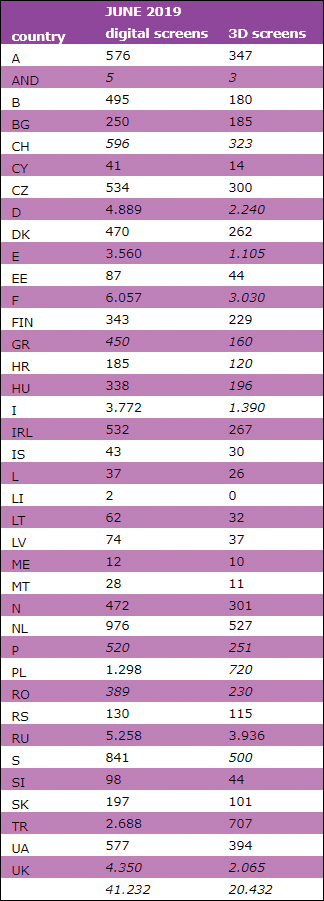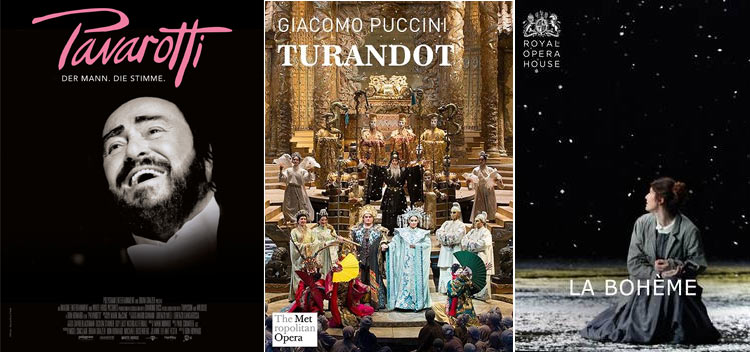
Reg. Trib. Milano n. 418 del 02.07.2007
- Direttore responsabile: Elisabetta Brunella
 |
 |
International Edition No. 161 - year 14 - 23 December 2019
Special edition on the occasion of the presentation
of the new statistics on the European digital landscape

more than 15,000 subscribers |

Digital and 3D screens in Europe: the new statistics as at 30th June 2019

© MEDIA Salles
SWITZERLAND: BUSINESS OFF THE BEATEN TRACK Inevitable that a young, all-round cinema buff, who has left a "Zalonian"* steady job to become an exhibitor (amongst other things), is likely to be showered with interviews. And interesting to note that to the question "Have you ever been sold out?" he replies: "Almost, thanks to art-films, in particular the one on Monet!" The words of Joel Fioroni, 28, from Ticino, with a diploma in film-making from the CISA in Lugano, who has been manager of the Lux Art-house of Massagno since January 2018, are an eloquent expression of the role that added content can play for a cinema that chooses to focus on quality, in order to compete with the market leaders. In this case the giant is the Cinestar of Lugano, which offers cutting-edge technology on its six screens, 3D and 4DX included, (i.e. high quality equipment which, thanks to the movement of the seats, creates sensorial effects synchronized with the action on the big screen). The programming, however, is principally mainstream and Fioroni comments: "For us this is an advantage: we no longer have competitors in the field of art-house cinema. This is a genre with a sense of its own, one it will always have, and what's more we are decidedly open to events that allow us to make ourselves known to a wider public." And so, with regard to broadening its horizons, alongside the usual offer of live opera and ballet, the Lux recently launched the initiative "Art in the Cinema", based on unpublished documentaries from the world of art - exclusive to Ticino. Shortly, "Hermitage - the power of art" will be arriving from Nexo Digital with "Frida - Viva la vida", which by virtue of a new agreement with the Arena Group will also be presented at the Palacinema and at the Muralto in Locarno. In fact this season the Lux "will be working for three" and taking its programme of added content to audiences in the city of the Golden Leopard, too. The event formula still holds good: two appointments in the same week, one on Wednesday at 8.30 p.m, the other on Sunday at 6 p.m, mainly for a senior audience. The "arthouse" and "added content off the beaten track" formulas also work well in Basel. Here, the Kult.kino, a five-screen complex in the city centre, together with the two screens of the Kino.camera, offers a selection of the top productions of classical opera by prestigious theatres, screened - in their recorded versions naturally - on Sunday mornings. "This formula," says Romy Gysin - the heart and soul of this authentic institution in quality cinema - has proved better suited to our spectators than the screening of live performances in the evening." From October onwards, audiences in Basel who are fans of "highbrow" music, can see "Carmen" by the Zurich Opera, "Norma" by the Royal Theatre of Wallonia, the Teatro Real of Madrid's "Flying Dutchman" with Fura dels Baus and Beethoven's "Ninth Symphony" by the Vienna State Opera. But here, too, there is no lack of offer regarding the figurative arts. Centre stage will be occupied by the Exhibition on Screen productions, starting with "Young Picasso" and continuing with "Van Gogh & Japan", "Rembrandt" and "Degas: Passion for Perfection". Even more focused and decidedly less commonplace, is the "programme" combining cinema and the theatre, with a series of documentaries selected in collaboration with the Basel Theatre, also presented as "events" on Sunday mornings. The title chosen to open the events is "A Trail on the Water", dedicated to Abbado, Nono and Pollini. There is no lack of a "screening event" on weekdays, either, thanks to "Midday at the Cinema", centring on the cult content of the moment i.e. biopics. As part of this, last October "Pavarotti", Ron Howard's moving documentary, has been screened, which, following its release in the United States in June, has started out on an authentic world tour. From the first week of October onwards Howard's third work devoted the super stars of music has been distributed in Switzerland by Pathé Films AG, whilst for years now Pathé Live has been bringing the most popular added content to the Swiss market, for example live opera from the MET and live ballet from the Moscow Bolshoi. These productions are mainly hosted by the Pathé network, which comprises 79 screens in 8 complexes in 7 towns or cities - but also in other cinemas, such as the Arthouse Piccadilly in Zurich. The Kitag group, in Basel, Berne, Lucerne, San Gallo and Zurich - still using the live formula - instead offers productions from London, such as opera by the Royal Opera House and performances by the Royal Ballet. A wealth of culture but business, too. It is no coincidence that the market in Switzerland records the highest average price in Europe for added content (almost 24 euros in 2018, compared to the average price calculated for all performances on offer in movie theatres, which comes to around 13.50 euros). And to quote Fioroni once again, "Added content can represent a safety net for the economic balance of a small theatre fighting to keep cinema alive on the big screen." * A reference to Checco Zalone, a well-known Italian comedian, whose humour revolves around topical stereotypes. This article was published in Cinema & Video Int'l, issue no. 12/2019 (Per leggere il testo in italiano cliccare qui)
|
|
We have started this new column giving voice to the people who have already been working with added content for some time now, gaining first-hand experience in the field which we think is worth sharing internationally.
Romy Gysin, Cinema manager, Kult.kino, Basel - What type of audience do you target with added content? Our first target is not to draw a certain type of audience, but to integrate an art-house cinema programme with added content focussing on a wide range of artistic expression... In times of digitization it is possible to cross borders from movies to other arts, so we offer an art-loving audience special events like operas, art exhibitions or a documentary series based on Basel theatre productions. This means the audience consists of a cross-section of art-house cinemagoers, though in general of course the public for these kinds of events is older and more experienced.
Our longest experience is in the field of opera: we have been offering the latter since 2012, both live and recorded. Admissions range from 10 to 170 per screening, so it covers a large spectrum. Exhibitions of paintings meet with considerable interest in an art town like Basel, so we have reasonable success with films in this field. - Is the ticket price for added content higher than the ticket price for films? The only, slight increase in price is for opera, whilst normal prices apply to all other screenings. - Which was the most successful screening in 2018/2019? (it would be interesting for us to know what you programmed in 2017-2018 and what you will programme in 2020). In 2019 the most important and successful event was Tosca, in a production by the Zurich Opernhaus. A total of nine events was offered, as in 2017, and six in 2018. We usually draw up an opera-programme over several months, mostly twice a year. We print flyers and advertise it on our website. This year we decided to offer only recorded operas, which means that we can programme them in a successful, regular slot on Sunday mornings. Since most of the operas are long, we include a coffee interval. The audience is quite stable and likes to know what is coming next. The “Exhibition on Screen” series of films will be shown several times in a month, mostly on weekends, some also in the early evenings. We try to start with special events and Q&As with experts. - Do you believe the Swiss market for added content/event cinema will develop in the near future? Everything that is fascinating to show an interested and curious audience is worth making an effort to bring to the screen. So it is important to keep a questioning and open mind towards any content that suits our goal. - Can you imagine initiatives that could give more visibility to added content/event cinema in Switzerland (professional conferences for cinema exhibitors/distributors, presentations of show-reels/trailers, informal gatherings etc.)? The products are here and the public is here but we need to connect, which often means a lot of work, so I don't think it's the professionals who need more visibility but the public that needs more information.
|
|

 - We know that you offer a variety of added content: what is the most successful type (opera, ballet, theatre, popular music, art documentaries etc)?
- We know that you offer a variety of added content: what is the most successful type (opera, ballet, theatre, popular music, art documentaries etc)?
